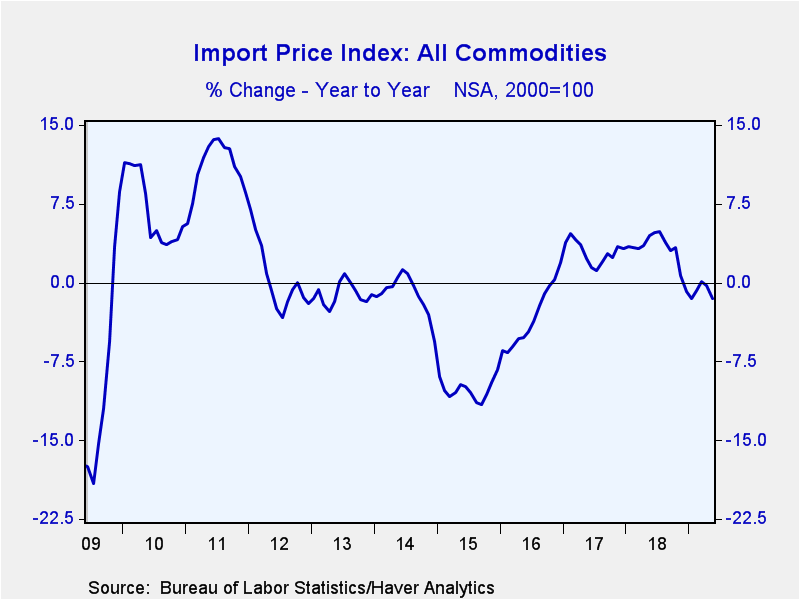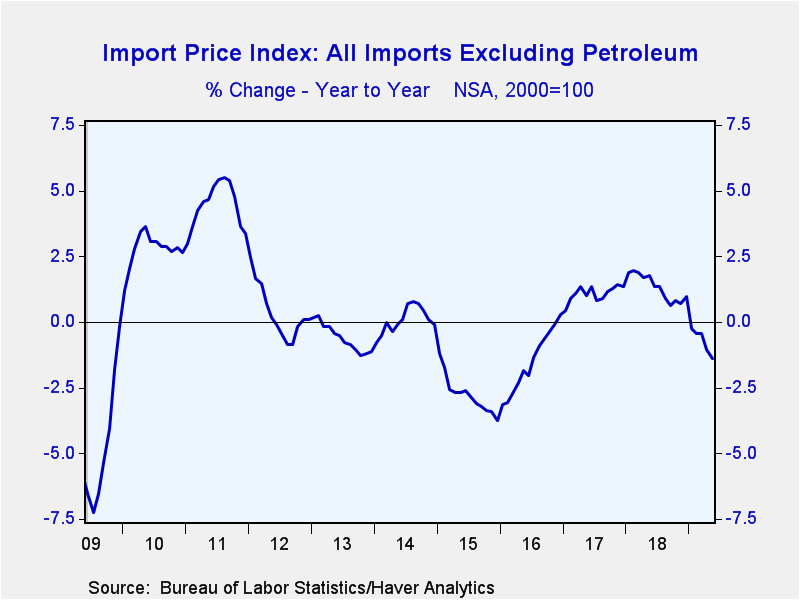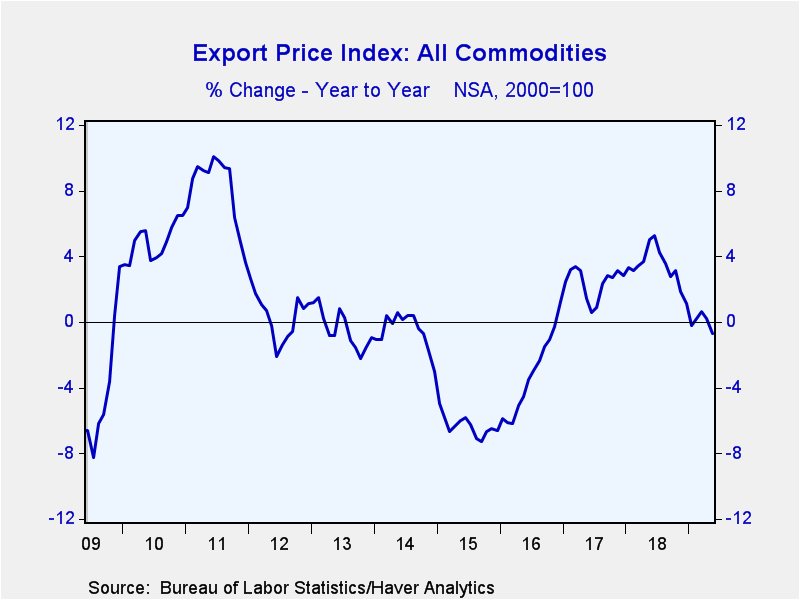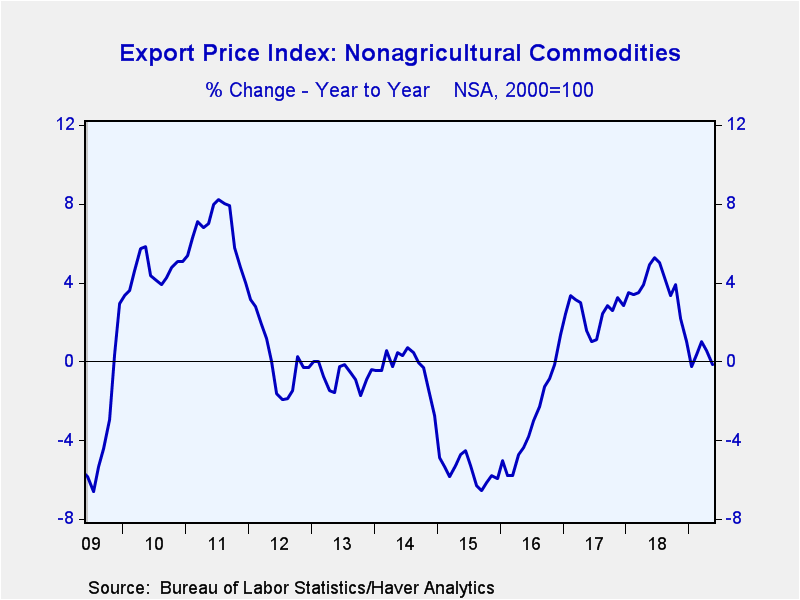 Global| Jun 13 2019
Global| Jun 13 2019U.S. Import and Export Prices Decline
by:Tom Moeller
|in:Economy in Brief
Summary
Import prices fell 0.3% (-1.5% y/y) during May following a 0.1% April improvement, revised from 0.2%. The decline matched expectations in the Action Economics Forecast Survey. These figures are not seasonally adjusted and do not [...]
Import prices fell 0.3% (-1.5% y/y) during May following a 0.1% April improvement, revised from 0.2%. The decline matched expectations in the Action Economics Forecast Survey. These figures are not seasonally adjusted and do not include import duties.
The weakening in import prices last month reflected a 0.9% decline (-1.9% y/y) in petroleum import costs, following a 4.7% April rise. Nonpetroleum import prices eased 0.3% (-1.4% y/y), the third consecutive month of weakness. Among end-use categories, industrial supplies & materials costs excluding petroleum fell 1.1% (-4.1% y/y) after a 2.8% decline. Capital goods prices eased 0.1% (-1.3% y/y) and have been declining since early last year. The decline reflects lower prices (-4.7% y/y) for computers, peripherals and semiconductors. Capital goods prices excluding these products were little changed y/y. Motor vehicle & parts prices edged 0.1% lower (-0.6% y/y) for the fourth straight month. Nonauto consumer goods prices held steady (-0.7% y/y) after falling 0.3% for two straight months. Meanwhile, foods, feed and beverage prices fell 0.8% (-0.2% y/y) following a 2.7% strengthening.
Export prices declined 0.2% last month (-0.7% y/y) following a 0.1% uptick during April revised from 0.1%. A 0.1% easing had been expected.
Agricultural commodities prices dropped 1.0% last month (-5.3% y/y), adding to the 1.5% decline in April. Nonagricultural export costs slipped 0.2% (-0.2% y/y) after three consecutive monthly increases. The cost of industrial supplies & materials fell 0.5% (-2.3% y/y) with lower petroleum prices. Prices excluding oil fell 0.3% (-1.8% y/y) after a 0.1% rise (-1.8% y/y). Motor vehicle & parts prices eased 0.1% (+0.4% y/y) after a 0.2% rise. Consumer goods prices excluding autos slipped 0.2% (+0.2% y/y) after a 0.3% gain. Capital goods improved 0.1% (1.1% y/y) but high-tech product prices fell 3.3% y/y. Capital goods prices excluding high-tech rose 0.2% (2.0% y/y). Meanwhile, foods, feeds & beverage prices fell 1.1% (-4.4% y/y) after declining 1.8%.
The import and export price series can be found in Haver's USECON database. Detailed figures are available in the USINT database. The expectations figure from the Action Economics Forecast Survey is in the AS1REPNA database.
| Import/Export Prices (NSA, %) | May | Apr | Mar | May Y/Y | 2018 | 2017 | 2016 |
|---|---|---|---|---|---|---|---|
| Imports - All Commodities | -0.3 | 0.1 | 0.6 | -1.5 | 3.1 | 2.9 | -3.3 |
| Petroleum & Petroleum Products | -0.9 | 4.7 | 6.2 | -1.9 | 22.0 | 26.6 | -19.7 |
| Nonpetroleum | -0.3 | -0.5 | 0.0 | -1.4 | 1.3 | 1.1 | -1.5 |
| Exports - All Commodities | -0.2 | 0.1 | 0.8 | -0.7 | 3.4 | 2.4 | -3.2 |
| Agricultural | -1.0 | -1.5 | 1.0 | -5.3 | 0.6 | 1.5 | -5.4 |
| Nonagricultural | -0.2 | 0.2 | 0.7 | -0.2 | 3.7 | 2.5 | -3.0 |
Tom Moeller
AuthorMore in Author Profile »Prior to joining Haver Analytics in 2000, Mr. Moeller worked as the Economist at Chancellor Capital Management from 1985 to 1999. There, he developed comprehensive economic forecasts and interpreted economic data for equity and fixed income portfolio managers. Also at Chancellor, Mr. Moeller worked as an equity analyst and was responsible for researching and rating companies in the economically sensitive automobile and housing industries for investment in Chancellor’s equity portfolio. Prior to joining Chancellor, Mr. Moeller was an Economist at Citibank from 1979 to 1984. He also analyzed pricing behavior in the metals industry for the Council on Wage and Price Stability in Washington, D.C. In 1999, Mr. Moeller received the award for most accurate forecast from the Forecasters' Club of New York. From 1990 to 1992 he was President of the New York Association for Business Economists. Mr. Moeller earned an M.B.A. in Finance from Fordham University, where he graduated in 1987. He holds a Bachelor of Arts in Economics from George Washington University.
More Economy in Brief
 Global| Feb 05 2026
Global| Feb 05 2026Charts of the Week: Balanced Policy, Resilient Data and AI Narratives
by:Andrew Cates










